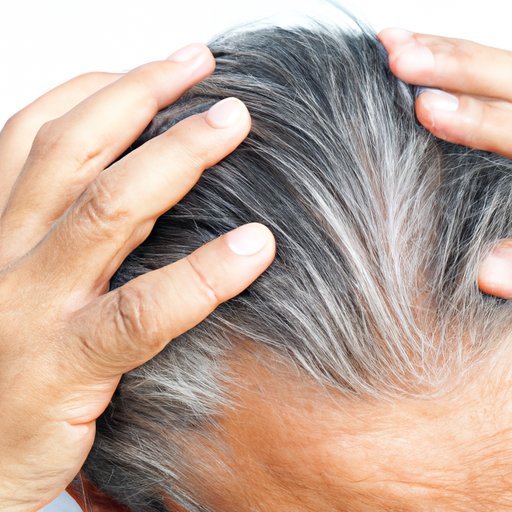
I. Introduction
Gray hair is often associated with aging, but many people experience graying hair much earlier than expected. While genetics play a major role in hair pigmentation, there is growing evidence that stress can also contribute to premature graying. Understanding the link between stress and gray hair is crucial for maintaining healthy hair and managing stress levels. This article will explore the science behind the connection between stress and gray hair, debunk common myths and misconceptions, and provide tips for managing stress to prevent premature graying.
II. Science Explains: How Stress Triggers Premature Graying of Hair
The color of hair largely depends on melanin, a pigment produced by specialized cells called melanocytes. Melanin is responsible for giving hair its natural color, from blonde to black. However, as we age, melanocyte activity decreases, leading to a reduced production of melanin and the eventual graying of hair.
This process is natural, but there are various factors that can accelerate hair graying, including stress. Stress triggers the release of stress hormones such as cortisol, which can interfere with melanocyte activity and cause premature graying of hair.
III. The Link Between Stress and Gray Hair: Debunking Common Misconceptions
There are several misconceptions about the link between stress and gray hair that have been widely believed for years. For example, some people believe that stress can turn hair gray overnight, but in reality, the process of graying hair takes time and is gradual.
Another misconception is that only extreme stress can cause premature graying, but even daily stressors can contribute to this process. While genetics play a key role, the role of stress in hair pigmentation cannot be ignored.
IV. Can Stress Really Turn Your Hair Gray? Experts Weigh In
Research studies have shown mixed results in terms of the link between stress and gray hair. Some studies have suggested that there is a connection, while others have found no significant association. However, many experts in the field believe that there is sufficient evidence to support the link between stress and premature graying.
One study conducted by researchers at New York University found that stress-induced damage to the DNA within hair follicle cells can lead to a depletion of melanocyte stem cells, which are responsible for hair pigmentation. This study highlights the importance of managing stress to maintain healthy hair.
V. Managing Stress to Prevent Premature Graying: Tips and Tricks
Reducing stress not only benefits hair health, but also has a positive impact on overall health and well-being. There are various effective ways to manage stress and prevent premature graying, including:
- Engaging in regular exercise and physical activity
- Practicing relaxation techniques such as meditation, deep breathing, and yoga
- Maintaining a healthy diet with sufficient vitamins and nutrients
- Getting enough sleep and rest
- Engaging in hobbies and activities that bring joy and relaxation
VI. Understanding the Biological Mechanisms Behind Stress-Induced Gray Hair
Stress triggers the release of stress hormones such as cortisol, which not only affects melanocyte activity but also impacts the hair follicle stem cells. Hair follicle stem cells have the ability to differentiate into various cell types, including melanocytes that produce melanin. However, stress can interfere with this process and lead to a reduction in the number and activity of hair follicle stem cells, ultimately contributing to premature graying.
VII. Conclusion
The link between stress and gray hair is a complex topic, but one that deserves attention and consideration. While genetics play a major role in hair pigmentation, reducing stress and managing stress levels can contribute to healthy hair and prevent premature graying. By engaging in lifestyle changes, relaxation techniques, and stress-management activities, individuals can take control of their stress levels and maintain healthy, vibrant hair.
Remember, there is no magic solution to completely prevent gray hair, but taking care of your hair and managing your stress levels the best you can can help keep your hair looking healthy.





